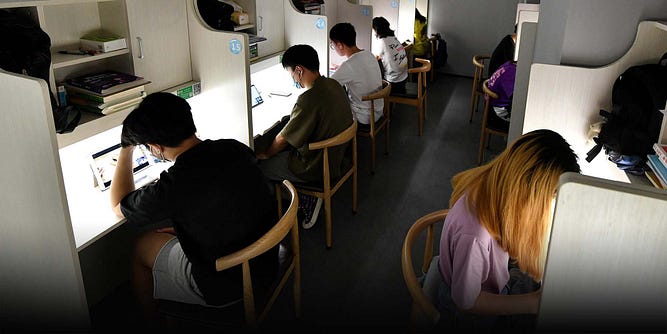
In recent years, paid study spaces have become increasingly popular among young people in China. From large cities to small towns, these spaces offer a quiet and focused environment for students to study and work on their projects. The trend has sparked a debate on whether “buying discipline” is good or bad. This article explores the reasons behind the popularity of paid study spaces, the benefits and drawbacks of this trend, and its implications for the future.
What are Paid Study Spaces?

Paid study spaces, also known as shared study rooms or co-working spaces, are commercial facilities that provide a quiet and comfortable environment for people to study or work. These spaces usually have desks, chairs, power outlets, Wi-Fi, and other amenities that help people focus on their tasks. Some paid study spaces also offer private rooms or cubicles for people who need more privacy or quietness.
The rise of paid study spaces in China can be attributed to several factors. Firstly, the increasing competition for education and job opportunities has put immense pressure on young people to perform academically. As a result, many students seek a quiet and focused environment where they can study without distractions. Secondly, the need for more suitable study space in public libraries and schools has led to a shortage of study space for students. Finally, the increasing popularity of remote work and freelancing has created a demand for affordable and flexible workspaces.
Benefits of Paid Study Spaces
Paid study spaces offer several benefits to students and workers. Firstly, they provide a quiet, focused environment that helps people concentrate on their tasks. This is especially important for students studying for exams or completing assignments. Secondly, paid study spaces offer a sense of community and support. Many people who use these spaces are like-minded individuals striving to achieve their goals. This creates a supportive and motivating environment that can help people stay on track. Thirdly, paid study spaces offer flexibility and convenience. Unlike public libraries or schools, paid study spaces are open 24/7 and do not have strict rules or regulations.
Drawbacks of Paid Study Spaces
Despite the benefits, paid study spaces also have some drawbacks. Firstly, using these spaces can be prohibitive for some people. In larger cities, a monthly membership can range from 1000 to 3000 yuan, which is only affordable for some. Secondly, the quality of these spaces can vary greatly. Some areas may be overcrowded, noisy, poorly maintained, distracting and counterproductive. Thirdly, using paid study spaces can create a culture of “buying discipline” where people rely on external factors to motivate themselves rather than developing their self-discipline.

Implications for the Future
The rise of paid study spaces reflects China's changing attitudes towards education and work. As the competition for academic and job opportunities intensifies, more people seek ways to improve their skills and knowledge. Paid study spaces provide a convenient and affordable way for people to achieve their goals. However, the trend also raises questions about the role of self-discipline and intrinsic motivation in achieving success. As more people rely on external factors to motivate themselves, there is a risk of creating a culture of “buying discipline” that may not be sustainable in the long run.
Conclusion
Paid study spaces have become a popular trend among young people in China. These spaces offer a quiet and focused environment that helps people concentrate on their tasks. However, the movement also raises questions about the role of self-discipline and intrinsic motivation in achieving success. As the competition for academic and job opportunities intensifies, balancing external stimulation and internal motivation is essential. Paid study spaces can help achieve short-term goals, but self-discipline and intrinsic motivation are necessary for long-term success.
Backlinks
“More young people are trying paid study centres for self-improvement”, Global Times, 15 Jan 2020, https://www.globaltimes.cn/content/1176939.shtml
“Private Study Rooms Emerge as Refuge for Examinees”, Sixthtone, 21 Oct 2022, https://www.sixthtone.com/news/1011458
“In a Class of Their Own: Surge in Demand for Guangzhou Paid Study Rooms”, HKTDC Research, 22 Nov 2022, https://research.hktdc.com/en/article/ODg4MjE1OTM3